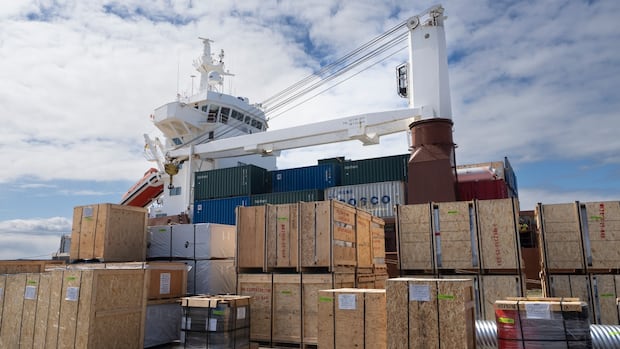Prime minister backs plans to redevelop northern Manitoba’s Port of Churchill

The federal government is gearing up for a massive investment in infrastructure projects, with Prime Minister Mark Carney hinting at new port infrastructure developments in Churchill, Manitoba. The government plans to allocate half a trillion dollars towards projects ranging from energy to ports to intelligence.
Carney revealed that the first wave of investments, set to be formally announced in the coming weeks, will focus on enhancing port infrastructure. Among the projects mentioned are reinforcing and expanding the Port of Montreal in Contrecoeur and establishing a new port in Churchill, Manitoba. The latter, located in one of Canada’s northernmost regions, offers Arctic Ocean access and is accessible by rail.
The announcement comes on the heels of discussions to explore a sustainable, year-round shipping season at the Port of Churchill. The potential for increased trade with Europe has sparked renewed interest in the port, with Manitoba Premier Wab Kinew expressing excitement about the possibilities for economic growth.
The federal and provincial governments have already invested millions in the railway line and port to establish a trade route through Hudson Bay and the Arctic. Kinew emphasized the need for additional infrastructure to fully capitalize on the economic potential of the port.
Arctic Gateway Group, the entity overseeing the Port of Churchill, welcomed Carney’s remarks, highlighting the port’s role in diversifying Canada’s trade and bolstering energy and critical minerals exports. The president and CEO of the group, Chris Avery, affirmed the port’s readiness to contribute to strengthening sovereignty in the North.
Experts and officials see the development of the Port of Churchill as a significant opportunity for economic growth, particularly as the Arctic ice melts, extending the shipping season. However, they also acknowledge the environmental risks associated with increased shipping activity, emphasizing the importance of careful planning and collaboration with Indigenous communities.
As the government moves forward with plans to enhance port infrastructure, stakeholders are focused on addressing environmental concerns and ensuring that the perspectives of Indigenous leaders are integrated into decision-making processes. The potential for economic growth at the Port of Churchill is promising, but it must be balanced with environmental sustainability and community engagement. The recent surge in COVID-19 cases has once again put a strain on our healthcare system. Hospitals are once again filling up with patients, many of whom are unvaccinated and suffering from severe symptoms.
Healthcare workers are once again facing long hours, high stress levels, and difficult decisions about how to best care for their patients. Many are feeling the effects of burnout, as they continue to work tirelessly to care for those in need.
As the Delta variant continues to spread rapidly, it is more important than ever for individuals to get vaccinated and take precautions to prevent the further spread of the virus. Vaccines have been proven to be safe and effective in preventing severe illness and death from COVID-19, and getting vaccinated is the best way to protect yourself and others.
It is also crucial for individuals to continue to wear masks, practice social distancing, and follow public health guidelines to help slow the spread of the virus. By working together and taking these steps, we can help alleviate the strain on our healthcare system and protect the health and well-being of our communities.
In addition to taking individual precautions, it is important for government officials to continue to provide support and resources to healthcare workers. This includes ensuring that hospitals have enough staff, supplies, and resources to care for patients, as well as providing mental health support to healthcare workers who are facing burnout.
As we navigate this challenging time, it is important for all of us to come together and support one another. By working together and taking steps to prevent the spread of COVID-19, we can help protect our healthcare system and keep our communities safe.




